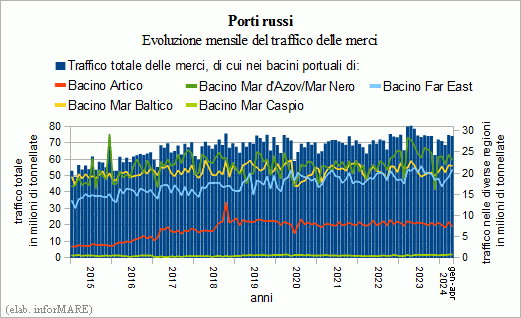
Last month, with more than 74 million tons of cargo
Russian ports recorded a decrease of -8%
of the loads passed on the docks compared to more than 80
million tonnes totalled in April 2023. The reduction is
generated by the -8% drop in export goods and the
-20% decrease in cabotage traffic,
to 58 million and seven million tonnes, respectively. In
growth in imported goods with less than four million
tonnes (+3%) as well as goods in transit with six
million tonnes (+2%). Overall, dry goods are
amounted to 38 million tonnes (-7%) and liquid to 36 million tonnes
million tonnes (-9%).
The Association of Russian Commercial Ports has announced that in the
In the first four months of 2024, global traffic was
288.4 million tonnes, with a decrease of -4.3% on the former
three months of last year. Export goods have been
225.9 million tonnes (-4.8%), imports 13.4
million tonnes (+3.1%), goods in transit 23.2 million tonnes
tonnes (+2.3%) and cabotage traffic was
equal to 25.8 million tonnes (-8.6%).
In the first four months of this year, dry goods were
equal to 141.8 million tonnes (-3.4%), of which 59.5 million tonnes
tonnes of coal (-15.0%), 25.3 million tonnes of
cereals (+11.8%), 18.3 million tonnes of containerised goods
(+10.9%), 13.9 million tonnes of mineral fertilisers
(+32.3%), 6.7 million tonnes of ferrous metals (-9.0%), 3.0
million tonnes of minerals (-6.7%) and 2.4 million tonnes of
tonnes of rolling stock (-3.2%). In the liquid bulk sector
The total figure was 146.6 million tonnes
(-5.1%), including 92.6 million tonnes of crude oil
(0.0%), 37.8 million tonnes of petroleum products (-18.5%),
12.7 million tonnes of liquefied natural gas (+2.7%) and 2.2 million tonnes
million tonnes of food products (+13.2%).
In the first four months of 2024, only the ports of the Arctic basin
handled 31.0 million tonnes of goods (-6.1%),
those of the Baltic Sea 85.5 million tons (-2.5%),
ports of the Sea of Azov-Black Sea 93.8 million tonnes (-6.9%),
the ports of the Caspian basin 3.0 million tonnes (+40.7%) and the
Russian ports in the Far East 75.1 million tonnes (-3.2%).
